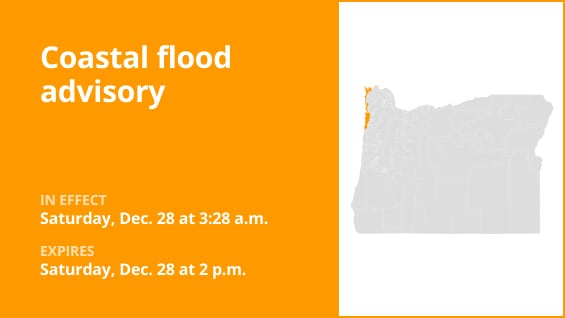At 3:28 a.m. on Saturday, the National Weather Service issued a new coastal flood advisory for the Clatsop and Tillamook County coasts, which was in force until 2 p.m.
In addition, the weather service warns of “tidal overflow flooding.”
“Minor flooding, up to one foot above ground level, during high tides is expected in the low-lying areas near bays, sloughs, and the lower reaches of the coastal rivers,” according to the weather service. “Tidal overflow flooding is anticipated when there is a coastal flood advisory in effect. Residents living along the coast in the region under warning should be on the lookout for rising water and take the necessary precautions to save lives and property.
Your guide to weather alerts: advisories, watches, and warnings
-
Flash flood warning: Take action!
When a flash flood is approaching or already happening, a warning is sent. Get to high ground right away if you’re in a flood-prone location. A flash flood is a quick, intense flood that can form in a matter of minutes to hours. Even in places that don’t get rain right away, flash floods can happen.
-
Flood warning: Take action!
When flooding is about to occur or has already started, a flood warning is issued.
-
Flood advisory: Be aware:
When flooding is not predicted to become severe enough to warrant a warning, a flood advisory is issued. However, it still has the potential to be extremely inconvenient and, if careless, to result in circumstances that endanger life and/or property.
-
Flood watch: Be prepared:
When the weather is conducive to flooding, a flood watch is issued. Flooding is not guaranteed, but it is a possibility.
Weathering the storm: Flood safety guidelines from the weather service
Knowing and adhering to the weather service’s flood safety recommendations can be extremely helpful when camping in low-lying areas or in places that are prone to flooding:
Go to a higher location:
Moving to higher ground should be your first course of action if you’re camping in a low-lying location or in an area that is prone to flooding.
Respect evacuation directives:
Immediately comply with any evacuation orders issued by local authorities. Make sure your house is locked before you leave.
Cut off appliances and utilities:
Disconnect your appliances and utilities if you have the time. By taking this precaution, electrical dangers during flooding are reduced.
Steer clear of waterlogged regions and basements:
Stay away from rooms with electrical outlets or cords that are submerged in water or basements. Electrical accident prevention is essential.
Quickly leave for your safety:
Evacuate right away if you see sparks or hear popping, crackling, buzzing, or snapping sounds. Steer clear of any water that might be electrically charged.
Avoid the floodwaters:
Even if floodwaters seem shallow, you should never try to go over them. You can be swept off your feet with power by just 6 inches of swift-moving water.
If you’re stuck, look for high ground:
If you find yourself caught by flowing water, move to the highest spot you can and dial 911 to reach rescue personnel.
Flooding is a possibility during periods of high rainfall, particularly in low-lying and flood-prone locations. Never drive on water on the road, even if it appears to be shallow. The weather service claims that most cars can be washed away by as little as 12 inches of swiftly moving water. Be knowledgeable and ready to stay safe.
Note: Every piece of content is rigorously reviewed by our team of experienced writers and editors to ensure its accuracy. Our writers use credible sources and adhere to strict fact-checking protocols to verify all claims and data before publication. If an error is identified, we promptly correct it and strive for transparency in all updates, feel free to reach out to us via email. We appreciate your trust and support!
